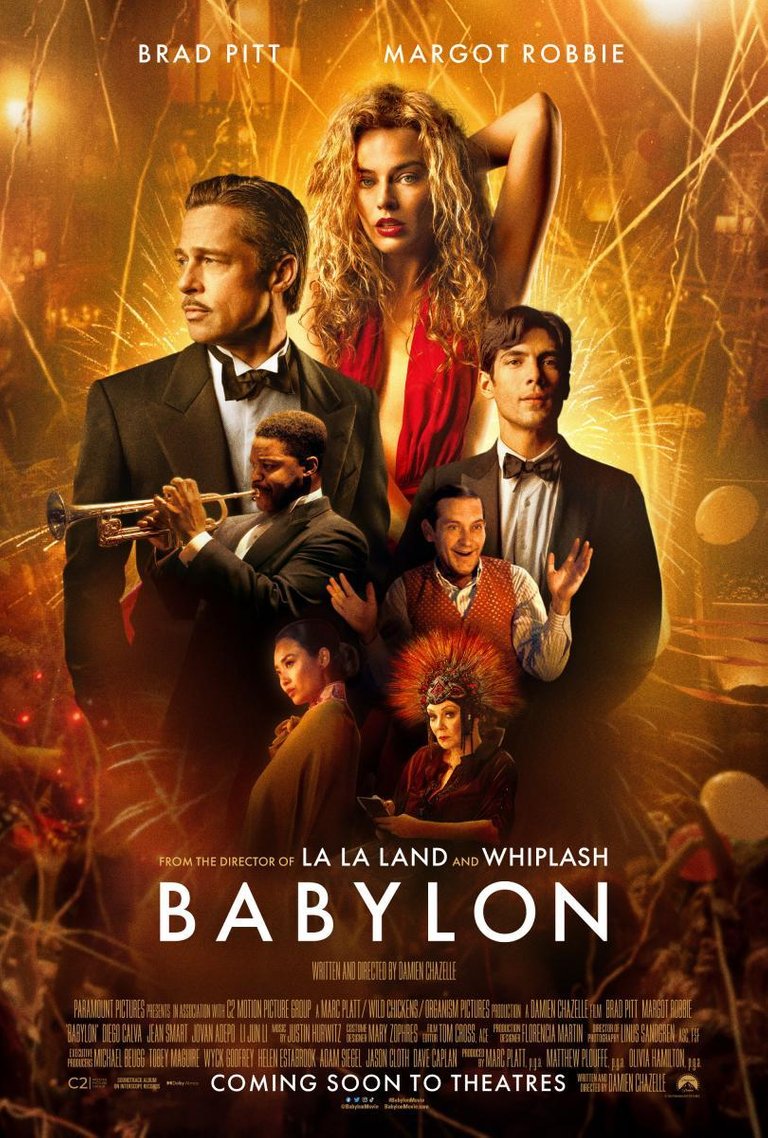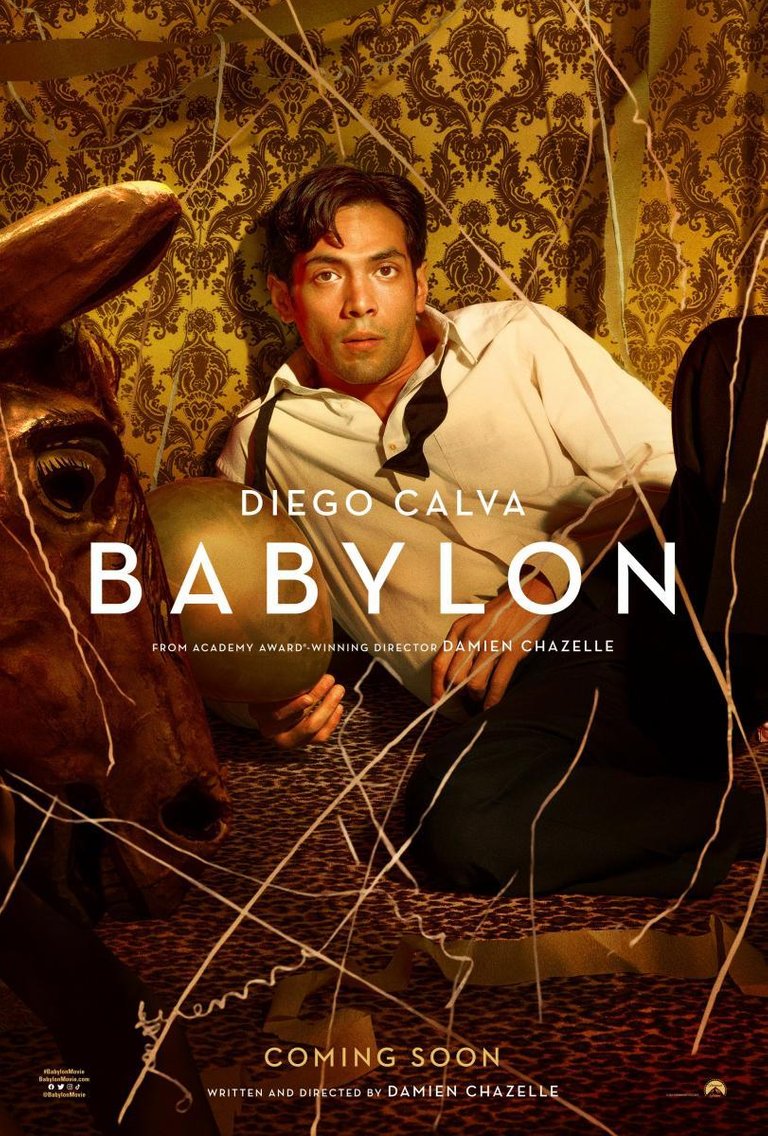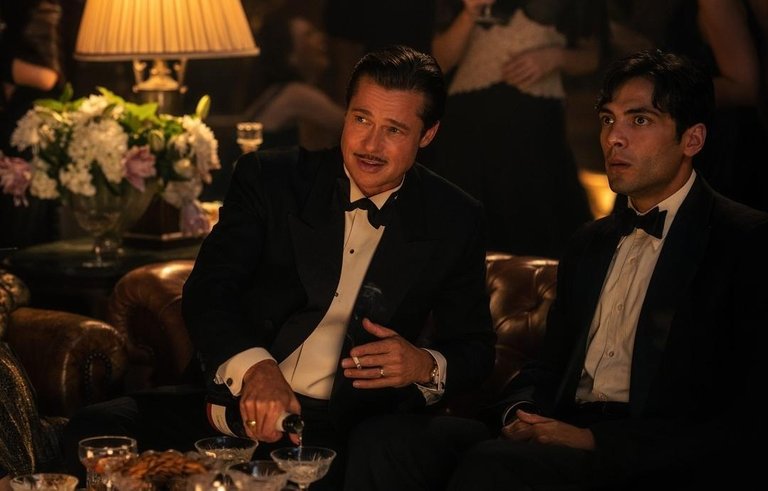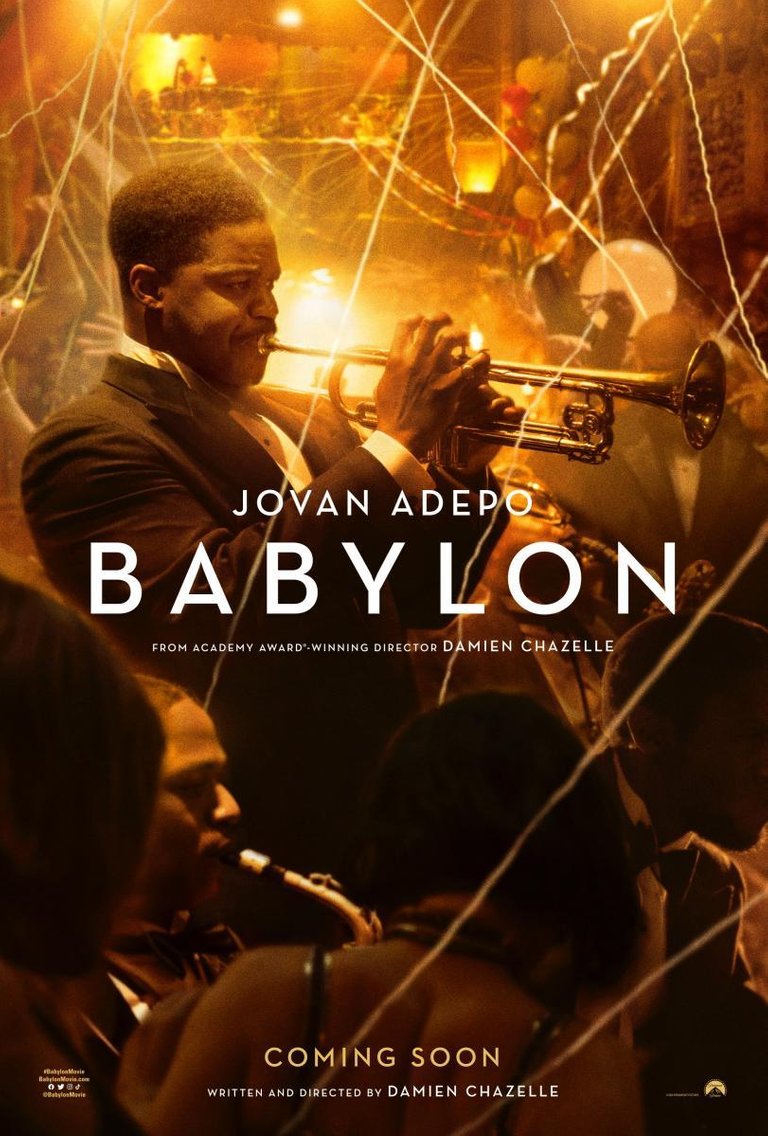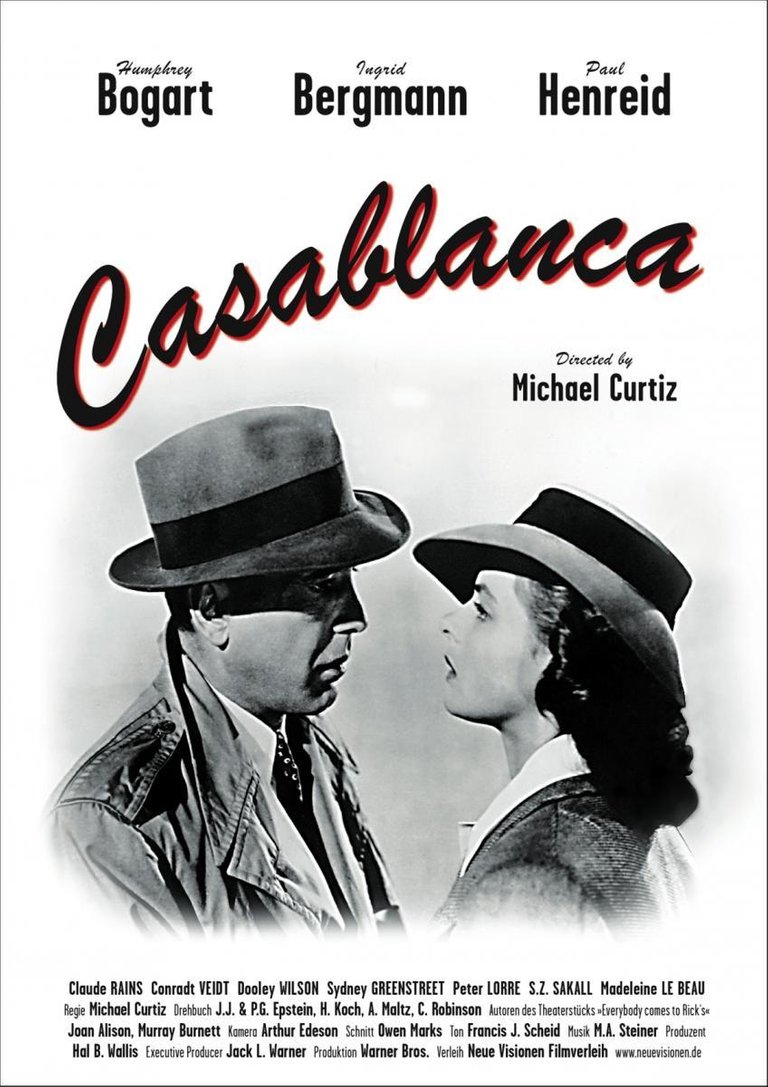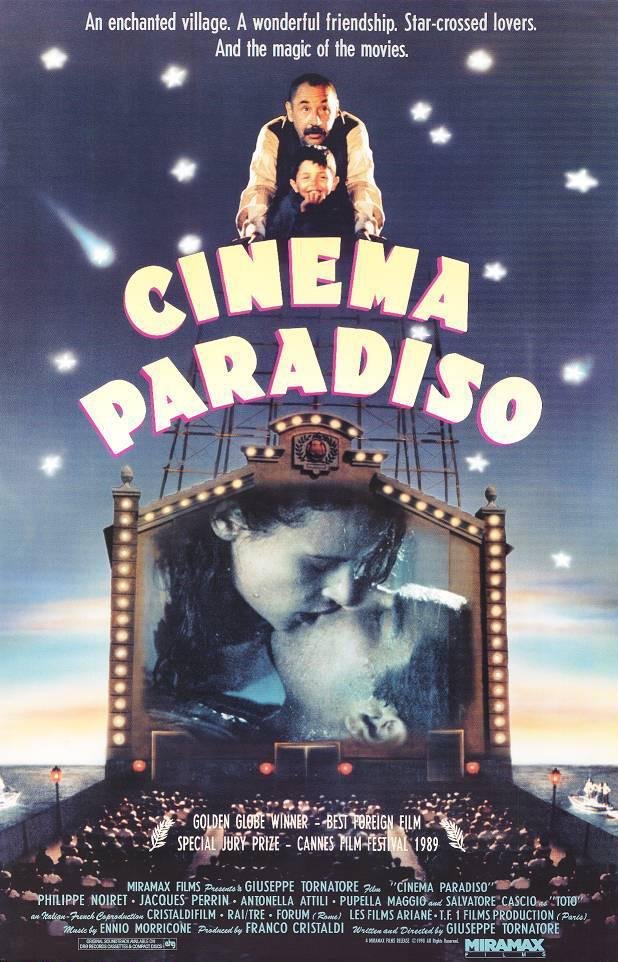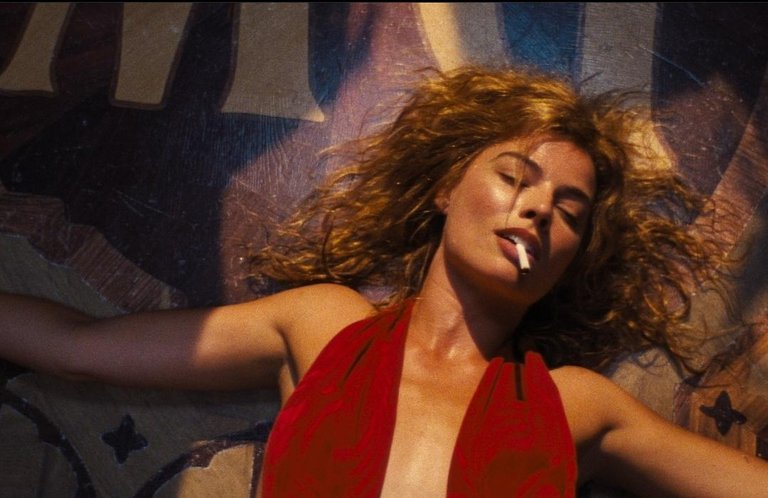
Del Director de "Whiplash" y "La La Land"
I admire the work of Demian Chazelle. I've seen all of his movies, even the modest Guy and Madeline on a Park Bench, and he strikes me as one of the best film directors today despite being younger than most. That's why, as soon as I heard about your latest film, I wanted to go see it on the opening day and enjoy it before hearing any opinions or reading any other reviews.
Admiro el trabajo de Demian Chazelle. He visto todas sus películas, incluso la modesta Guy and Madeline on a Park Bench, y me parece uno de los mejores directores de cine de la actualidad a pesar de ser más joven que la mayoría. Por eso, en cuanto supe de su más reciente película quise ir a verla el día del estreno y disfrutarla antes de oír cualquier opinión o leer cualquier otra reseña.
I think the first thing to say about Babylon is that it's unlike anything Chazelle has shown us so far. Or well, yes, in the core, in the center of the story, is the essence of Chazelle, but in the form and the final product the director of First Man allowed himself to go further than ever. In other words, if you're expecting to see a love story like Mia and Sebastian's in La La Land full of quotes, romantic moments, and singing and dancing scenes, you're in for more than one surprise because Babylon is a film that begins in Los Angeles in 1926 and tells a story full of excesses, ambition, sex, drugs, corruption, excessive pleasures, around different figures of the emerging film industry. Directors, screenwriters, actors, actresses, cameramen, live in a whirlwind of depravity that seems to disappear for a moment, but then reaches even more sordid levels underground. On set there are the sets, the production, the action sequences, all that magic that surrounds the seventh art, but outside the studio and in the corners of the city there is a rampant decadence and parties so luxurious, excessive and scandalous that they make Jay Gatsby look like a rookie.
Creo que lo primero que debe decirse con respecto a Babylon es que no se parece a nada de lo que Chazelle nos había mostrado hasta ahora. O bueno, sí, en el núcleo, en el centro de la historia, está la esencia de Chazelle, pero en la forma y el producto final el director de First Man se permitió ir más lejos que nunca. Es decir, que si están esperando ver una historia de amor como la de Mia y Sebastian en La La Land llena de citas, momentos románticos y escenas de canto y baile, se van a llevar más de una sorpresa porque Babylon es una película que inicia en Los Angeles en 1926 y cuenta una historia repleta de excesos, ambición, sexo, drogas, corrupción, placeres desmesurados, en torno a diferentes figuras de la emergente industria del cine. Directores, guionistas, actores, actrices, camarógrafos, viven en una vorágine de depravación que por un momento parece desaparecer, pero que luego llega a niveles aún más sórdidos bajo tierra. En el set son los decorados, la producción, las secuencias de acción, toda esa magia que envuelve el séptimo arte, pero fuera del estudio y en los rincones de la ciudad se vive una desenfrenada decadencia y unas fiestas tan lujosas, excesivas y escandalosas que hacen parecer a Jay Gatsby como un novato.
The prologue (the opening sequence before the movie title appears on the screen) is one of the best parts of Babylon. It begins with an exclusive, opulent and excessive party in which Manuel Torres, "Manny" (Diego Calva) is working for Don Wallach, an executive of an important studio. Wallach is known for the parties he throws, veritable Babylonian bacchanalia where moderation is a forbidden word.
El prólogo (la secuencia inicial antes que aparezca el título de la película en pantalla) es un de las mejores partes de Babylon. Inicia con una exclusiva, opulenta y excesiva fiesta en la que Manuel Torres, "Manny" (Diego Calva) se encuentra trabajando para Don Wallach, ejecutivo de un importante estudio. Wallach es conocido por las fiestas que da, verdaderos bacanales babilónicos en donde moderación es una palabra prohibida.
Nellie LaRoy (Margot Robbie) attends that party, an aspiring actress who has not yet participated in any film but who in a conversation tells Manny that she is already a star. You don't become a star, either you are or you aren't, and Nellie feels and truly believes that she's one. Nellie is a whirlwind, a true force of nature that no one can tame, not even herself, and that vitality and strength will be her charm and her downfall. For his part, Manny also wants to be part of the film industry. Not as an actor, his aspirations are more modest, he would do almost anything to be on a recording set and as he says "to be part of something bigger". The cinema transcends, it's bigger than life, bigger than oneself, it's a magic that Manny wants to be a part of. From there we will follow the adventures and misadventures of Nellie and Manny who will meet again repeatedly throughout the following decades in which the magic of the cinema will constantly elevate them to Olympus and make them descend into misery. Throughout their encounters and misunderstandings, a Manny who has been in love with Nellie since the night he met her will profess his love in different ways and Nellie, like any conflicted, wild and self-centered protagonist, will detract from that love at higher levels than she Jenny did with poor Forrest Gump.
A esa fiesta acude Nellie LaRoy (Margot Robbie) una aspirante a actriz que no ha participado aún en ninguna película pero que en una conversación le dice a Manny que ella ya es una estrella. Uno no se convierte en estrella, o lo es o no lo es, y Nellie siente y verdaderamente cree que lo es. Nellie es un torbellino, una verdadera fuerza de la naturaleza que nadie puede domar, ni siquiera ella misma y esa vitalidad y esa fuerza serán su encanto y su perdición. Por su parte, Manny también quiere formar parte de la industria cinematográfica. No como actor, sus aspiraciones son más modestas, haría casi cualquier cosa por estar en un set de grabación y tal como lo dice "ser parte de algo más grande". El cine trasciende, es más grande que la vida, más grande que uno mismo, es una magia de la que Manny quiere formar parte. A partir de allí seguiremos las aventuras y desventuras de Nellie y Manny quienes volverán a encontrarse en repetidas ocasiones a lo largo de las siguientes décadas en las que la magia del cine constantemente los elevará al Olimpo y los hará descender a la miseria. A lo largo de sus encuentros y desencuentros, un Manny enamorado de Nellie desde la noche en que la conoció profesará su amor de diferentes formas y Nellie, como toda protagonista conflictuada, salvaje y egocéntrica, desmerecerá ese amor a niveles más altos de lo que lo hizo Jenny con el pobre Forrest Gump.
However, they are not the only protagonists of the story. Jack Conrad (Brad Pitt) perhaps the biggest actor in the industry lives in constant divorces and remarriages, in the midst of great filming, attending parties and awards shows like a true star. Sidney Palmer (Jovan Adepo) is a talented trumpeter who gets to work in well-known Hollywood movies; Lady Fay Zhu (Li Jun Li) sets the exotic tone to various scenes with her performances, and Elinor St. John (Jean Smart) is a critic whose reviews have great power to influence the general public.
Sin embargo, no son ellos los únicos protagonistas de la historia. Jack Conrad (Brad Pitt) tal vez el actor más grande en la industria vive en constantes divorcios y nuevos matrimonios, en medio de grandes filmaciones, asistiendo a fiestas y premiaciones como una verdadera estrella. Sidney Palmer (Jovan Adepo) es un talentoso trompetista que llega a trabajar en reconocidas películas de Hollywood; Lady Fay Zhu (Li Jun Li) le da el tono exótico a varias escenas con sus actuaciones y Elinor St. John (Jean Smart) es una crítica cuyas reseñas tienen un gran poder de influencia en el público general.
Throughout more than three hours of Babylon the destinies of these characters will cross on more than one occasion, but each and every one in their own way will experience promotions and suffer falls due to different events that can be summarized in only one thing: the greatness of cinema. The starting year of the film is key, 1926, because it allows us to see how cinema was made just before technological progress that changed everything: sound pictures. Earlier the music and the sound of the movies were not recorded on the tapes that were only images, that's why we see the posters with the phrases in Chaplin's stories. But in 1927 Warner released The Jazz Singer, the first sound film in history, that is, it incorporated image and sound and we could see and hear the actors on the screen. It doesn't matter if the film was good or not, because what really mattered was that it changed everything and that change expanded the possibilities of the filmmakers, but it also presented great challenges for them, for the actors, and for everyone involved; challenges that appear in Babylon and that seem to follow the motto of adapt or die, can actors accustomed to silent films adapt to this new challenge? This turning point in the history of cinema has already been honored in other films such as The Artist, but I had not seen it from the perspective that Chazelle shows us.
A lo largo de más de tres horas de duración de Babylon los destinos de estos personajes se cruzarán en más de una oportunidad, pero todos y cada uno a su manera vivirán ascensos y sufrirán caídas por diferentes hechos que pueden resumirse en una sola cosa: la grandeza del cine. El año de inicio de la cinta es clave, 1926, porque permite ver cómo se hacía cine justo antes de un progreso tecnológico que lo cambió todo: el cine sonoro. Anteriormente la música y el sonido de las películas no se grababan en las cintas que eran solamente imágnes, por eso vemos los carteles con las frases en las historias de Chaplin. Pero en 1927 la Warner estrenó The Jazz Singer, la primera película sonora de la historia, es decir que incorporaba imagen y sonido y podíamos ver y escuchar a los actores en la pantalla. Poco importa si la película fue buena, o no, porque lo realmente importante fue que lo cambió todo y ese cambio expandió las posibilidades de los cineastas, pero también presentó grandes desafíos para ellos, para los actores, y todos los involucrados; desafíos que se muestran en Babylon y que parecen seguir la consigna de adaptarse o morir, ¿pueden los actores acostumbrados al cine mudo adaptarse a este nuevo desafío? Este punto de inflexión en la historia del cine ya ha sido homenajeado en otras películas como The Artist, pero no lo había visto desde la perspectiva que nos lo muestra Chazelle.
In addition to those already mentioned, the film features performances by Tobey Maguire, Max Minghella, Katherine Waterston, Samara Weaving, Eric Roberts, Olivia Wilde, and even Spike Jonze himself has a minor role in the film; the direction is very good, the photography exceptional and the soundtrack is tremendous, a new confirmation of the talent of Justin Hurwitz, Demian Chazelle's main composer who has already won an Oscar for La La Land and two Golden Globes for the soundtracks of First Man and Babylon (a clear Academy Award contender in this category). Now, despite these elements, the film has been a box office failure in the US and has been hit by critics. In my opinion it is due to the script. Chazelle's proposal is wild, unbridled and scatological. The making of Babylon is for Chazelle what the fact that some American bride posed for Playboy represented to the world at some point.
Además de los ya mencionados, la película cuenta con las actuaciones de Tobey Maguire, Max Minghella, Katherine Waterston, Samara Weaving, Eric Roberts, Olivia Wilde y hasta el mismísimo Spike Jonze tiene un papel menor en la cinta; la dirección es muy buena, la fotografía excepcional y el soundtrack es apoteósico, una nueva confirmación del talento de Justin Hurwitz, compositor de cabecera de Demian Chazelle que ya ganó el Oscar por La La Land y dos Globos de Oro por los soundtracks de First Man y Babylon (claro candidato al premio de la academia en esta categoría). Ahora bien, a pesar de estos elementos, la película ha sido un fracaso de taquilla en los EEUU y ha sido golpeada por la crítica. En mi opinión se debe al guión. La propuesta de Chazelle es salvaje, desenfrenada y escatológica. La realización de Babylon es para Chazelle lo que en algún momento representó para el mundo el hecho de que alguna novia de América posara para Playboy.
In my opinion, Babylon shows Chazelle's new skills in filmmaking (like the epilogue, that's a visual homage to film history) as well as great courage in taking creative risks. In my opinion, the script works, it's fun, it has a rhythm (although maybe there are a couple of parts that are a little loose), violent (sometimes it reminds me of Tarantino), but I think it's coherent with the story it tells. Regardless of whether the Hollywood society of the twenties was like that or not, what is important to me is that the universe proposed in the film - and in any film - responds to its conditions and is faithful to its proposal. And I think Babylon is.
En mi opinión, Babylon muestra nuevas capacidades de Chazelle a la hora de hacer cine (como el epílogo, ese un homenaje visual a la historia del cine) además de una gran valentía al asumir riesgos creativos. A mi parecer el guión funciona, es divertido, tiene ritmo (aunque quizás hay un par de partes un poco flojas), violento (a veces me recuerda a Tarantino), pero creo que es coherente con la historia que cuenta. Indiferentemente de si la sociedad de Hollywood de los años veinte era o no era así, lo importante para mí es que el universo planteado en la película - y en cualquier película - responda a las condiciones de la misma y sea fiel a su propuesta. Y creo que Babylon lo es.
In its own way, this film is also a tribute to the seventh art. It doesn't have the serene nostalgia of The Fabelmans or the poetry of Cinema Paradiso, but if you're objective, you'll find Babylon deep reflections on what it means to be part of something bigger. It's wonderful, yes, while you're under the spotlight, but in the course of film history (and life) people are expendable. In the last part there is a conversation between Jack and Elinor in which they talk about the future, when all the people who worked on those films have died. The story progresses, the show must continue and the protagonists must abdicate to make way for new names, but at the same time the prize of immortality remains. Every time I watch Casablanca, Humphrey Bogart and Ingrid Bergman re-exist for me. His characters belong to the past, but also to the future. Being a part of something so magical, so huge, is as ruthless as it is wonderful and Babylon reflects both extremes very well. It is excessive in some parts, yes, but not for that reason it is less full of nostalgia or beautiful reflections.
A su manera, esta cinta también es un homenaje al séptimo arte. No tiene la nostalgia serena de The Fabelmans ni la poesía de Cinema Paradiso, pero si se es objetivo se encontrarán en Babylon profundas reflexiones sobre lo que significa formar parte de algo más grande. Es maravilloso, sí, mientras estás bajo el foco, pero en el curso de la historia del cine (y la vida) las personas somos prescindibles. En la última parte hay una conversación entre Jack y Elinor en la que se habla del futuro, cuando todas las personas que trabajaron en esas películas hayan fallecido. La historia avanza, el show debe continuar y los protagonistas deben abdicar para dar paso a nuevos nombres, pero a su vez queda el premio de la inmortalidad. Cada vez que veo Casablanca, Humphrey Bogart e Ingrid Bergman vuelven a existir para mí. Sus personajes pertenecen al pasado, pero también al futuro. Ser parte de algo tan mágico, tan enorme, es tan despiadado como maravilloso y Babylon refleja muy bien ambos exremos. Es excesiva en algunas partes, sí, pero no por eso está menos llena de nostalgia o de hermosas reflexiones.
I don't know whether to recommend this film or not. I think you have to have an open perspective and really immerse yourself in the story without expectations and go to the cinema not only to see but to feel the whole experience. Some will find it sordid, excessive (it is no coincidence that I have repeated this word so much in my review), but it has extraordinary sequences, a great performance especially that of Margot Robbie, the Wild Girl of the story, and a nostalgic, crazy homage, that highlights light and darkness, the best and the worst of the magic of cinema and of the human being. I understand that some critics have not liked it because showing in Hollywood a story that reflects such a sordid side of its mythology would be like showing a movie about pedophilia in church in the Vatican and expecting the Pope to applaud you for it, but despite how scatological, how wild and outrageous it can be and aside from a few plot blemishes, I think Babylon is a great movie, have any of you seen it yet? I would like to know your opinions.
No sé si recomendar, o no, esta película. Creo que hay que tener una óptica abierta y de verdad sumergirse en la historia sin expectativas e ir al cine no sólo a ver sino a sentir toda la experiencia. Algunos la encontrarán sórdida, excesiva (no es casualidad que haya repetido tanto esta palabra en mi reseña), pero tiene secuencias extraordinarias, una gran actuación en especial la de Margot Robbie, la Chica Salvaje de la historia, y un homenaje nostálgico, alocado, que resalta luz y oscuridad, lo mejor y lo peor de la magia del cine y del ser humano. Entiendo que a algunos críticos no les haya gustado porque mostrar en Hollywood una historia que refleja un lado tan sórdido de su mitología sería como mostrar en el Vaticano una película sobre pedofilia en la iglesia y esperar que el Papa te aplauda por eso, pero a pesar de lo escatológica, lo salvaje y escandalosa que puede ser y más allá de algunas imperfecciones en la trama, creo que Babylon es una gran película, ¿alguno de ustedes ya la ha visto? Me gustaría conocer sus opiniones.
Reviewed by | Reseñado por @cristiancaicedo
Other posts that may interest you | Otros posts que pueden interesarte:
 |
|---|
